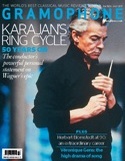Texte paru dans: / Appeared in: |
|
|
Outil de traduction (Très approximatif) |
|
|
Reviewer:
Alexandra Coghlan
Barely an hour long, the oratorio’s concision is accounted for by the sermon that would have divided parts 1 and 2. Cut free from this liturgical weight, the work is a contemplative affair structured as an allegorical dialogue between Religion, Peace, Devotion and History (roles taken, respectively, by bass, soprano, tenor and baritone soloists), with the chorus providing the voice of the Christian faithful. It’s not a form or a libretto calculated to generate great drama, and the musical results are correspondingly moderate. There’s no overture or sinfonia to provide preamble, so the music launches straight in with a duet – the graceful ‘Holder Friede’ – in which Peace (Regula Mühlemann) and Religion (Benjamin Appl) celebrate their new intimacy. Obbligato flutes bill and coo in sympathetic affection with the young soloists, and the whole lilts along nicely enough under Goebel’s direction. But, setting the tone for the whole recording, there’s a sense of music leaning back in its seat rather than reaching out to demand attention. Period precision and politeness seem insufficient for Stephan MacLeod’s aria ‘Ihr werdet gedrungen’, with its threats of dungeons, torture and flames, while the weapons of Appl’s ‘Schau, das sind meine Waffen’ are similarly blunt. Mühlemann’s treble-like soprano finds the affirmation but not the anxiety in ‘So hart bei den Klippen’, and tenor Daniel Johannsen – so expressive and Evangelist-like in his recitative – tends to the mannered in arias. The chorus provide clean, crisply articulated chorales and a rather splendid fugal finale, but it’s too little too late. While Holder Friede is an interesting and opportune discovery, Goebel’s recording sells it short. A little more life and a little less respect might have made all the difference. |
|




